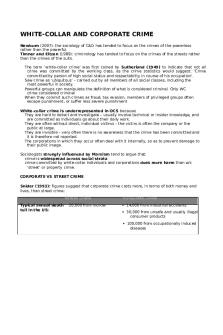10 mark question on white collar crime PDF

| Title | 10 mark question on white collar crime |
|---|---|
| Course | Sociology - A1 |
| Institution | Sixth Form (UK) |
| Pages | 1 |
| File Size | 44.1 KB |
| File Type | |
| Total Downloads | 105 |
| Total Views | 138 |
Summary
10 mark question on white collar crime and corporate crime, achieved 10/10...
Description
Applying material from Item A, analyse 2 reasons why corporate and white collar crime may be less likely to be reported to the police and prosecuted than crimes committed by working class people (10 marks) One reason why corporate and white collar crime may be less likely to be reported to the police and prosecuted then crimes committed by working class people is due to the institution of protection. As a result of institutional protection, corporate and white collar crime are often not reported and prosecuted. This is because government reliance on business may mean that corporate crime such as price-fixing or environmental offences or any doubt with by a reprimand are fine. A company with white collar crime may not want anyone to know that this has happened (for the sake of their reputation) So as a result to deal with it internally. If a bank was found to have an employee. Stealing money it could mean a loss of public confidence in the company. They may deal with it internally. To support this, statistics show the number of white-collar crime prosecutions in the UK sell by 12% over the past year, despite an increase in reported cases. This statistics support item a suggestion that despite white-collar crime and corporate crime being reported, it can still go “and recorded in criminal statistics” as the statistic shows that although reported Whitecollar crime has increased, the fact the number of prosecutions don’t follow the pattern suggest events of the beans out with outside of court and the public eye. Another reason as to why corporate and white collar crime may be less likely to be reported to the police and prosecutors and crimes committed by working-class people is due to the fact these types of crimes are harder to detect. This agrees with eyes and a suggestion that “many white-collar crimes of corporate crimes remain undetected“, Croall Argues this consist of lack of awareness that a crime has been committed is because victims may not know that they are being misled. For example, in 2013 food adulteration, the biggest food scandal of the 21st-century, was when horsemeat was found in burgers. From the trial for this case, the judge concluded that illegality in the company had also involve the faking of documents, commissioning of bogus official stamps, passing off in beerier beef trimmings as higher grade meat and sheeting of customs officers since the 1980s. This example proves that victims do not always know they are victims, hence corporate and white collar crime is less likely to be reported to the police and then prosecuted....
Similar Free PDFs

White Collar Crimes- Notes- Q and A
- 63 Pages

Toc 2 marks - 2 mark question answer
- 31 Pages

Question & Answers on arrays
- 3 Pages
Popular Institutions
- Tinajero National High School - Annex
- Politeknik Caltex Riau
- Yokohama City University
- SGT University
- University of Al-Qadisiyah
- Divine Word College of Vigan
- Techniek College Rotterdam
- Universidade de Santiago
- Universiti Teknologi MARA Cawangan Johor Kampus Pasir Gudang
- Poltekkes Kemenkes Yogyakarta
- Baguio City National High School
- Colegio san marcos
- preparatoria uno
- Centro de Bachillerato Tecnológico Industrial y de Servicios No. 107
- Dalian Maritime University
- Quang Trung Secondary School
- Colegio Tecnológico en Informática
- Corporación Regional de Educación Superior
- Grupo CEDVA
- Dar Al Uloom University
- Centro de Estudios Preuniversitarios de la Universidad Nacional de Ingeniería
- 上智大学
- Aakash International School, Nuna Majara
- San Felipe Neri Catholic School
- Kang Chiao International School - New Taipei City
- Misamis Occidental National High School
- Institución Educativa Escuela Normal Juan Ladrilleros
- Kolehiyo ng Pantukan
- Batanes State College
- Instituto Continental
- Sekolah Menengah Kejuruan Kesehatan Kaltara (Tarakan)
- Colegio de La Inmaculada Concepcion - Cebu












